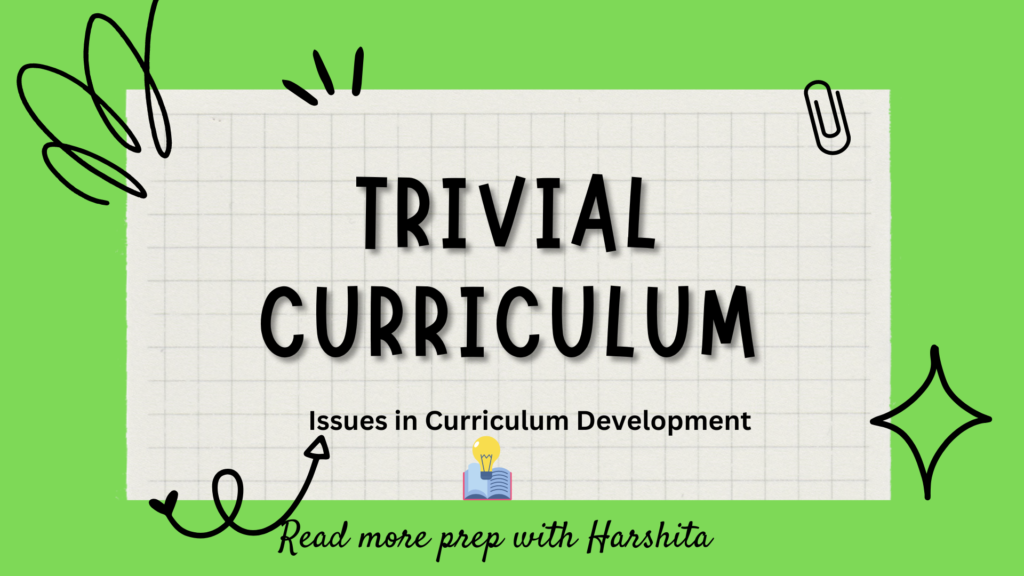A trivial curriculum is a curriculum that is not challenging or thought-provoking. It is often characterized by a focus on memorization and regurgitation of facts, rather than on critical thinking and problem-solving. Trivial curricula can be found in all levels of education, from elementary school to college.
A trivial curriculum is one that lays great emphasis on rote learning and irrelevant facts and figures that students are forced to learn.
Reasons behind it :
There are a number of reasons why a curriculum might become trivial.
- One reason is that it may be designed to meet the requirements of standardized tests, which often focus on factual recall rather than on more complex skills.
- Another reason is that teachers may feel pressure to cover a lot of material in a short amount of time, which can lead to a focus on the trivial rather than the essential.
- Finally, students themselves may be uninterested in learning, which can make it difficult for teachers to engage them in challenging and meaningful work.
Problem with Trivial Curriculum :
The effects of a trivial curriculum can be far-reaching. Students who are not challenged in school are less likely to develop the critical thinking and problem-solving skills they need to succeed in college and in the workforce. They are also more likely to become bored and disengaged from learning, which can lead to dropping out of school.
Most of students go through the vigours of rote learning throughout their school and college lives and forget the knowledge acquired.
Trivial facts and figures are of little value to adults and so they cannot be meaningful for children.
The time that could be utilized for actual learning is wasted in rote learning. Through a trivial curriculum, students can at the most retrieve information to
pass exams or impress teachers. Retrieval of information can be best achieved through computers and teachers should encourage learners to think and engage them in problem-solving activities. (Omstein and Hunkins, 1988.)
There are a number of things that can be done to prevent a curriculum from becoming trivial. One important step is to ensure that teachers are well-trained and have the resources they need to create challenging and engaging lessons. Another important step is to give students more opportunities to participate in hands-on learning activities and to work on projects that are relevant to their interests. Finally, it is important to create a school culture that values learning and encourages students to take risks and try new things.
By taking these steps, we can help to ensure that all students have the opportunity to receive a high-quality education that will prepare them for success in college, in the workforce, and in life.
Also Read: Criteria for Content Selection

Also Visit: Prep with Harshita


I cling on to listening to the rumor speak about getting free online grant applications so I have been looking around for the finest site to get one. Could you advise me please, where could i find some?
I enjoy your writing style really loving this internet site.
I precisely had to say thanks once again. I’m not certain the things that I might have carried out in the absence of the entire tips and hints shared by you over such industry. It actually was an absolute difficult case in my opinion, however , taking note of the very expert approach you resolved it forced me to weep with joy. I’m just grateful for this assistance as well as hope you find out what an amazing job you’re doing training most people thru your web blog. Probably you haven’t got to know all of us.
I conceive this web site has got very fantastic pent subject material blog posts.
Thanks for every other informative blog. The place else may I am getting that kind of info written in such an ideal method? I’ve a undertaking that I am simply now working on, and I’ve been on the look out for such info.
As a Newbie, I am permanently searching online for articles that can benefit me. Thank you
Your point of view caught my eye and was very interesting. Thanks. I have a question for you.
amei este site. Pra saber mais detalhes acesse nosso site e descubra mais. Todas as informações contidas são informações relevantes e diferentes. Tudo que você precisa saber está está lá.